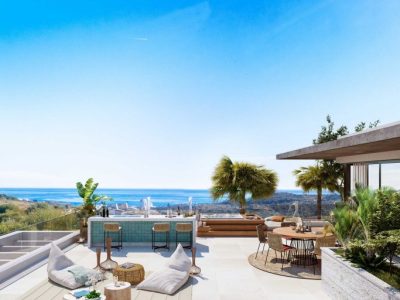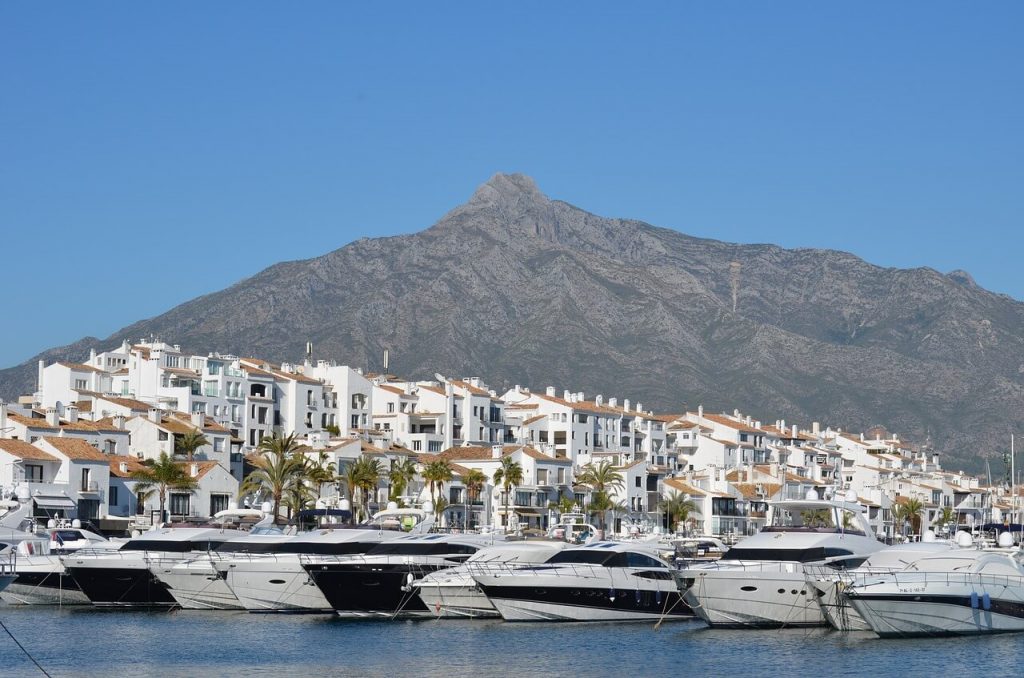
The Spanish government is thinking of a scenario in which the borders would remain closed for longer and foreign tourists would not be allowed in for the Summer season 2020.
Over the last few decades, travel has gone from being a pleasure reserved for the upper classes. Advances in the commercial aviation industry and the tourism boom have resulted in 1.5 billion trips worldwide by 2019, according to the World Tourism Organisation. In 2020, growth of three to four percent was predicted, but the coronavirus is going to upset any previous estimates.
It goes without saying that the Coronavirus has left its marks in the normally vibrant area of Marbella and Puerto Banús.

For example, customers and shoppers who come to Puerto Banús no longer queue up at the restaurants in the port area, but go, through the only access guarded by security guards wearing latex masks and gloves, to buy the essentials at the department store supermarket overlooking one of the busiest shopping areas in the municipality. The high-end vehicles parked on the seafront in the port, separating the shops of the most prestigious clothing brands from the most luxurious yachts in the world has given way to the uninterrupted horizon of closed establishments and perfectly aligned boats on closed pontoons.
The Marbella Town Hall previously labelled rightfully the Easter tourist season as ‘to be lost’ and trusts that the crisis situation caused by the coronavirus will be dealt with in time for the hotel and commercial sectors of the municipality to save the summer season. The taxi fleet is currently 50% operational and the number of passengers on public transport, which is free for registered residents, has dropped by 85 percent.
Hollywood-actor Antonio Banderas is forced to stay in his Marbella villa ever since the start of the lockdown in Spain. The Málaga-born actor was travelling there from Madrid after filming of the movie he is making with Penelope Cruz was suspended. His life partner, Nicole Kimpel, is ‘trapped’ in Switzerland with her sister Barbara and her father, so Antonio Banderas is sitting out this lockdown on his own. He says the coronavirus crisis is going to affect everybody, but at the same time, he is hopeful about the future for Malaga and the Costa del Sol, even though “very hard” times are on the way.
In his many hours of free time he studies, reads scripts and books and, above all, coordinates the social work carried out by the Fundación Lágrimas y Favores, of which he is the founder and president. Banderas is also working with the Agrupación de Cofradías, the Association of Religious Brotherhoods, with its president Pablo Atencia, who is a good friend. With 53,000 euros and the help of his Foundation, Banderas is helping to fight the crisis. They are distributing hundreds of single-use medical gowns, gloves, masks and shoe covers to hospitals, homes for the elderly and pharmacies.
And there is more positive Corona-COVID 19-related news from the area.
According to statistics from Andalucia.com, the Costa del Sol health district had 441 confirmed cases, 21 deaths and 128 cured as of 12-04-2020. And the situation on the coast is looking very promising. The amount of new cases has decreased dramatically. Just 14 new cases have been recorded compared to the peak day of April 2 when the Costa del Sol region saw 180 people diagnosed with the virus. For the first time in three weeks no coronavirus deaths have been reported in Malaga province in daily figures. In the past 24 hours just one person has had to be admitted into intensive care, meaning the province has 143 patients in ICU.

Earlier this month, the Marbella town hall launched a disinfection campaign across the town’s 40 pharmacies. According to councillor for Health Enrique Rodríguez, this measure is being taken “because these establishments are usually the first port of call for residents who present some kind of symptoms or have some doubts about coronavirus”.
Andalucia is sixth on the list in Spain for coronavirus cases. Madrid (47,146), Cataluña (34,726), Castilla La Mancha (14,054), Castilla Leon (12,628) and Pais Vasco (11,018) are the worst-hit communities.
With more than 15,000 deaths and more than 153,000 confirmed infections, Spain is one of the worst affected countries in the world. According to the Spanish ABC, the Spanish government sets the stage for a summer without any or very limited foreign tourism due to the coronavirus. Several executive sources acknowledge to ABC that they are studying the option of prevention of foreign tourists in the summer of 2020.
Of course, the idea is to reduce overcrowded events in certain areas. So what about going to the beach? This possibility is not yet excluded, but limitations in terms of capacity are one of the measures that the epidemiological and scientific experts would have advised, and the Government will study thoroughly. But one thing is for sure, it will be very difficult to spot images of tourists fighting for the front line of the beach or those crowded beaches.
“What is going to happen now,” analyses travel journalist Alberto Menéndez, “is a return to domestic tourism, of proximity, in which value is given to one’s own. It will be a perfect moment to rediscover the wonders of our country, a return to the subtle.
Another colleague in the Cabinet concurs with this idea: “International tourism will take time,” he says, because before the borders are reopened, “connectivity must be restored” and “means must be provided to ensure that it does not spread. Spain is being one of the countries hardest hit by this crisis. But at the same time, other countries are lagging behind in the scenario of contagion and deaths. The problem lies in entering the country, but also in leaving Spain: “We must recover the confidence that coming to Spain does not affect health, but we must also have the confidence that the virus will not be brought to us”, the Government assures us, so it is assumed that it must be an issue that “must be approached from the international arena”.
For Pablo Gonzalo, who runs El Pimpi, one of Malaga’s iconic bars for tourists, the immediate future is going to mean attracting local people and tourists from other parts of Spain. Before the crisis began, around 50 per cent of the clients in this city centre establishment were from outside Malaga, so he believes it is essential to adapt to the circumstances. “We business owners have to press the ‘re-set’ button and start the battle from zero,” he says in the April edition of SurinEnglish.
This feeling of uncertainty is shared by Carlos Franco, director of Meliá Costa del Sol, who says that “there are cancellations, but nothing can be assessed yet, although what is left of March and April will undoubtedly be a disaster”. The manager of this recently renovated hotel believes that the pandemic is going to be “a strong blow with a big crisis in the short term, but we hope that we can face the beginning of the high season, in May and June, in the best possible way and with a more positive face”.
Going on holiday in your own country would be allowed and even promoted. At least, this is what several sources claim. Even though certain restrictions are possible there: for example, it would be compulsory to wear a mouth mask on public transport and to follow the social distancing rules.
Since 14 March the state of emergency has been in place in Spain and since 30 March the country is in full lockdown. The measures were later extended until 26 April. Check our website regularly to stay up to date about the situation around Marbella, Puerto Banus, Mijas and other popular luxury locations on the Costa del Sol.
Cilo Marbella is an exclusive boutique agency specialising in the sale and rental of luxury residential property in the Marbella region of Spain.



